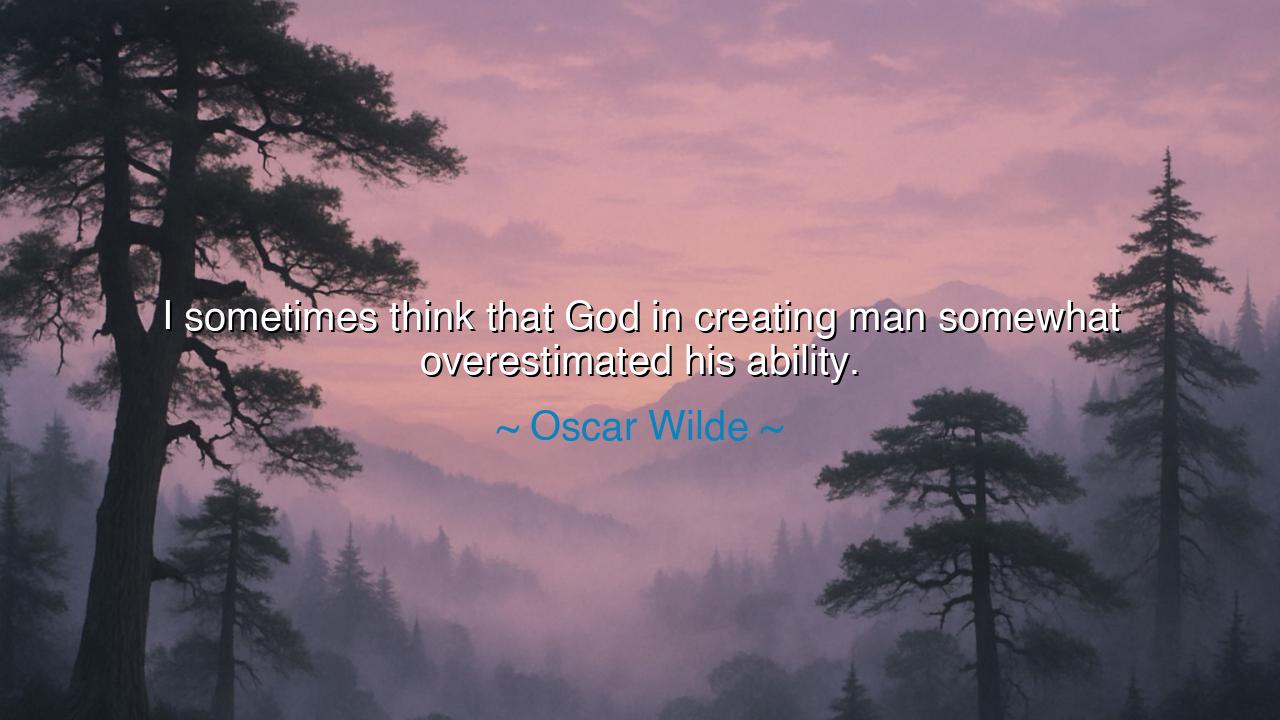
I sometimes think that God in creating man somewhat overestimated






Listen, O children of wisdom, to the words of the great Oscar Wilde, who, in his characteristic wit and insight, declared: "I sometimes think that God in creating man somewhat overestimated his ability." These words, though spoken with irony and humor, carry with them a profound reflection on the nature of humanity. Wilde, ever the observer of life’s contradictions, presents a thought that questions the limits of human potential and the divine act of creation. God, in His infinite wisdom, created man with great purpose and potential, but at times, it seems that humanity falls short of that divine vision, struggling with its own imperfections, pride, and folly.
In the ancient texts and teachings, the act of creation was often portrayed as both a great gift and a heavy responsibility. The gods, whether in Greek, Norse, or other ancient mythologies, imbued humankind with the divine spark, the gift of intellect and will, but they also recognized the frailty of man. Prometheus, the titan who gave fire to humanity, gifted men with the fire of reason and creativity, but that same fire led to hubris and downfall, as men sought power and control beyond their measure. The gods saw the potential in humans, but they also saw the dangers inherent in that potential—a potential that, if misused, could lead to destruction and suffering.
Wilde’s words reflect this ancient understanding of human nature—the idea that while humanity was created with the potential for greatness, it is often weighed down by its own limitations. We are beings of great capacity, yet we are also beings of great folly. In our arrogance, we often think ourselves more capable than we are, forgetting the wisdom of humility and the need for divine guidance. We overestimate our own abilities, believing that we can control forces greater than ourselves, and in doing so, we fail to live up to the greatness bestowed upon us.
Consider the story of King Nebuchadnezzar, who ruled Babylon with immense power and pride. In his arrogance, he boasted, “Is this not the great Babylon I have built as the royal residence, by my mighty power and for the glory of my majesty?” (Daniel 4:30). But in that very moment, his greatness was taken from him. He was humbled, driven to madness, and made to live like an animal for seven years. His story is a timeless reminder that humanity often overestimates its own abilities, thinking it can control the forces of nature, the will of God, and the path of fate. It is only when we are humbled that we come to understand our true place in the divine order.
Wilde’s words also suggest a deep, albeit humorous, commentary on the human condition. We are creatures of both immense capability and flawed imperfection. We build civilizations, create art, explore the cosmos, and achieve great feats. And yet, we are also capable of immense folly, of war, greed, and pride, which mar the beauty of our creations. God’s gift to humanity, the ability to create and shape the world, often becomes corrupted by our ego, desire, and blindness. Wilde’s statement is not a condemnation of mankind, but rather a reflection on our nature—that in our quest for greatness, we too often fail to acknowledge our fragility and limitations.
The lesson here is one of humility and self-awareness. While we are capable of great things, we must remember that we are not infallible. To acknowledge the limits of our own abilities is not to diminish ourselves, but to live wisely, understanding that true greatness comes not from overestimating our potential, but from recognizing our dependence on the divine, on the guidance that comes from beyond ourselves. It is in humility that we find our strength, and in wisdom that we unlock our true potential.
So, O children of wisdom, let us live with humility and self-awareness. We are beings of great potential, created in the image of the divine, but we are also beings of great fragility. Let us acknowledge our limitations, recognizing that true power does not come from self-sufficiency but from our relationship with the divine and with the world around us. Just as Nebuchadnezzar’s pride was humbled, so too must we learn to temper our ambitions with humility and wisdom. Let us strive not to overestimate our abilities, but to walk with grace, understanding that in our humility, we find the true strength to create, to lead, and to build in accordance with divine will.






AAdministratorAdministrator
Welcome, honored guests. Please leave a comment, we will respond soon